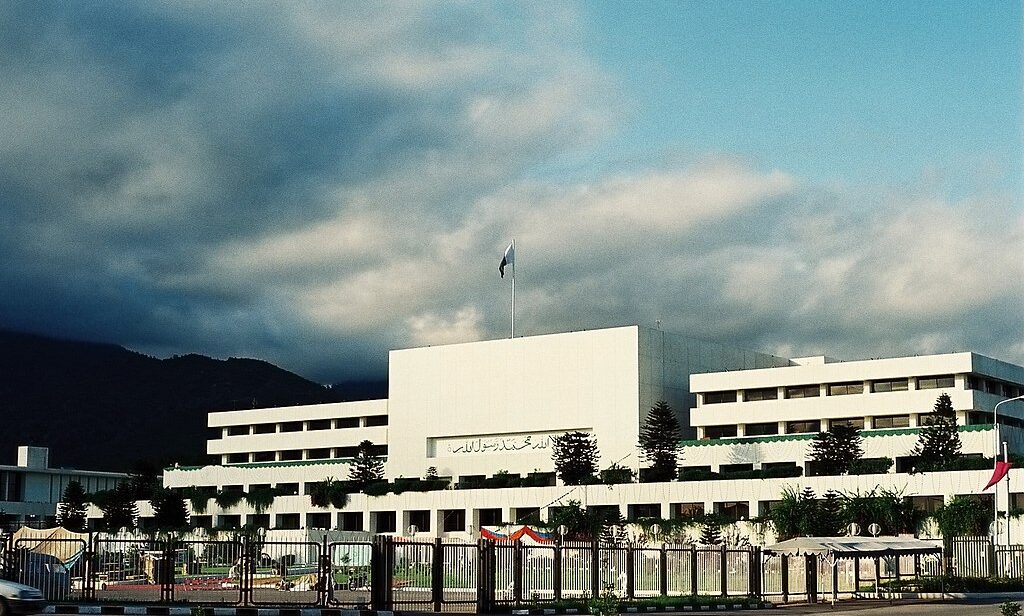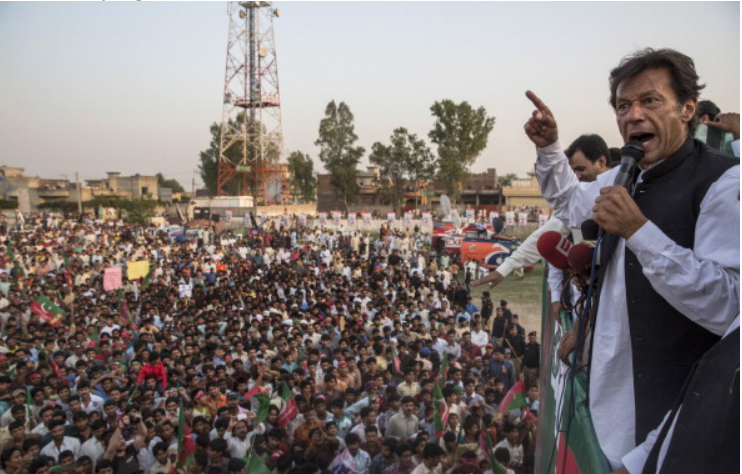
The PTI led by Imran Khan came into power with a consistent narrative that promised to eliminate elite-led corruption—allegedly rampant among opposition leaders—which would inevitably revive Pakistan’s economy. However, this narrative began to falter as the PTI’s central and provincial governments failed at governing their respective administrative units during their four years in office. The then-opposition used their provincially concentrated vote bank to rally against Imran Khan. This consensus eventually formed the Pakistan Democratic Movement (PDM), a joint opposition front, that ultimately ousted the Khan-led PTI government on April 9, 2022 making him the first Pakistani Prime Minister to be voted out of office through a Vote of No Confidence (VoNC).
The addition of the 18th Amendment to Pakistan’s Constitution has made provincial politics more consequential to political stability. The 18th Amendment—passed in 2010 during the Pakistan People’s Party (PPP) government—gave the four provinces increased autonomy relative to the federal government through increased budget spending and administrative rights. This year, it enabled several provincial parties and individuals with strong provincial voter banks to play a vital role in uprooting Imran Khan from office. The PTI’s failure to consolidate the federation through an inability to facilitate provincial administration worsened the center-province power balance. This essay will establish how each province’s politics affected the PTI, coalition allies, and opposition amidst political powerplays preceding the VoNC.
Sindh
The Pakistan People’s Party (PPP) formed Sindh’s government through a majority in 2018. However, despite the PPP’s majority, the political stage was set for confrontation. In a significant electoral upset for the PPP, the PTI triumphed in Karachi, which, while remaining under Sindh’s jurisdiction, remains the province’s largest and most influential constituency.
The PTI’s failure to consolidate the federation through an inability to facilitate provincial administration worsened the center-province power balance.
The PTI has long criticized the PPP’s decade-long policies in Sindh, promising a change of the status-quo when in office. The critiques of the PPP ranged from not instituting solid waste management mechanisms in Karachi, appointing a controversial mayor, instituting a European-style COVID-19 lockdown at the expense of daily wage laborers, and being responsible for decades of administrative and governance neglect.
The confrontational environment between the PPP and PTI resulted in needless semantic political powerplays that detracted from the PTI’s governance. The PTI attempted to hijack the PPP-instituted Benazir Income Support Program—a social safety scheme that provides direct cash transfers to the most vulnerable—by rebranding it as “Ehsaas” while facing additional challenges in implementing the program in rural Sindh without PPP support. The PTI failed to rectify the PPP’s decade-long mismanagement of Sindh by not prioritizing governance.
Much of the PTI’s electoral success in Karachi and sway in Sindh can be attributed to its partnership with the Muttahida Qaumi Movement (MQM) in a coalition alliance from 2018 to 2022. The MQM’s voter base are primarily Karachi residents who immigrated from India during Partition and speak native Urdu. Soliciting their coalition support was essential for the PTI to win Karachi and compete with the PPP for provincial control in Sindh.
During the PTI’s tenure, Karachi’s living situation continued to remain unbearable for residents, who experienced monsoon floodings, water and power shortages, and anti-encroachment drives resulting in homelessness under the PTI. The MQM, which enjoys a large Karachi-based Muhajir vote bank, could not afford to lose Karachiites’ goodwill due to the PTI’s misgovernance. In March 2022, after four years in the PTI’s coalition, the MQM announced it would join the PDM’s coalition days before the Vote of No Confidence. With the MQM bidding farewell, the PTI lost one of its most important provincial coalition partners in the National Assembly.
Punjab
In 2018, the PTI formed government through a slender majority in Punjab. However, Imran Khan’s nominee for the Punjab Chief Minister, Usman Buzdar, proved unpopular both internally within the PTI and externally in the (then) opposition. Historically, the post is held by politically powerful members in the Punjab Assembly; current Prime Minister Shehbaz Sharif was previously the Chief Minister of Punjab between 2013 and 2018. In comparison, PTI’s Usman Buzdar’s relatively low-profile baffled policymakers. Speculations about the unconventional choice later led to Farah Khan, Bushra Bibi’s friend and confidant, leaving the country in early April 2022 after (unproven) allegations surfaced accusing her of influencing Imran Khan’s decisions about his executive appointments in Punjab.
Prior to the 2018 election, Imran Khan successfully received support from the Junoobi Punjab Sooba Mahaaz Party (JPSM), led by Makhdoom Khusro Bakhtiar. The JPSM broke its historic alliance with the PML-N in favor of the PTI on the condition that the PTI will take tangible steps to create a fifth Pakistani province: South Punjab. This was supported by a wide range of lawmakers, including within the PTI, who hailed from South Punjab. While the PTI repeatedly attempted to pass the requisite legislation, Punjab’s provincial administration and other lawmakers wielding influence and power did not allow the PTI to fulfil its promise in over almost four years.
By the end of 2021, forward blocks emerged from within the PTI. Imran Khan’s close confidant, friend, and financier, Jahangir Tareen, was booked for money laundering by the Federal Investigation Agency (FIA). His sudden alienation from Imran Khan had negative ramifications for the Tareen’s (and PTI’s) voter base, who saw him as the face of PTI in Punjab but was now out of favor. Several members of the so-called “Tareen Group,” including dozens of disgruntled PTI parliamentarians in the Punjab Assembly, voted for PMLN’s Hamza Shehbaz (and not PTI’s candidate) as Chief Minister of Punjab during the week of the Vote. The PTI failed to demonstrative administrative muster in Punjab and implement its provincial policy reforms, which undermined its campaign promise for a better governed Punjab under a PTI government.

Khyber Pakhtunkhwa
The PTI’s provincial base is Khyber Pakhtunkhwa (KP). The PTI is the only party to be re-elected in KP throughout Pakistan’s political history, winning the majority in 2013 and 2018. Despite winning two consecutive elections in KP and ruling for almost ten years, the PTI failed to tackle corruption from within its ranks.
In 2016, the Director-General of the Ehtessab Commission (EC), an important provincial anti-corruption institution, resigned following legislation that restricted the institution’s powers to charge members of the KP Assembly of corruption. In 2018, the PTI dissolved the EC, despite the opposition’s resistance. Twenty-nine references filed against PTI members in KP, including those relating to sitting ministers, were not heard by the EC. Slowly, the PTI’s sham anti-corruption became exposed as being an instrument of political persecution. The PTI government did not address other corruption charges leveled against them, including foreign funding allegations on party funds, lack of accountability on its Billion Trees Tsumani, and the Bus Rapid Transport project in Peshawar. This came to a boil in the 2021 local bodies election in KP, where the PTI lost to opposition parties and independent candidates.
Although not the only reason for the VoNC, the PDM’s ability to leverage its provincial political capital and vote banks allowed for the VoNC to be pushed forward after four years of Center-provincial disharmony under the PTI.
Ethno-political movements such as the Pashtun Tahafuz Movements (PTM) significantly influenced local politics and discourse in KP during the PTI’s tenure. The PTM originated due to the extensive militarization, missing persons, and internal displacement faced by the local Pashtun population in KP and Balochistan. The PTI government failed to create a political consensus with the aggrieved locals who suffered from collateral damages during the War on Terror. The PDM had two Parliamentarians in the federal government, Mohsin Dawar and Ali Wazir, who voted against the PTI during the Vote of No Confidence. Dawar took the floor of Parliament on the day of voting, expressing his disappointment towards the PTI government—which he called a “hybrid regime”—in its treatment of Pashtuns. These factors pushed opposition parties in KP to organize and join the PDM, which led to Imran’s ouster at the federal level.
Balochistan
While several parties and individual MNAs left the PTI’s coalition during the weeks and months leading up to the Vote of No Confidence, the Baloch National Party (BNP) parted with PTI in 2020. The BNP claimed the decision was influenced by the PTI’s failure to live up to its commitments to constructing dams, providing drinking water, repatriating Afghans, addressing Baloch missing persons, and instituting quota-based Baloch representation at the federal level.
In 2021, Imran Khan attempted to neutralize Baloch nationalist groups by appointing Shahzain Bugti—son of Nawab Akbar Bugti, whose assassination in the Musharraf regime aggravated militancy in Balochistan—as a special assistant in his federal cabinet. Khan had hoped to harmonize the increasingly tense environment and develop the Gwadar port to its full capacity under CPEC. However, Bugti later joined the PDM and voted against Khan. Other Baloch MNAs, such as Akhtar Mengal, took the floor of Parliament on the day of voting to highlight the issues of poverty, missing persons, extensive militarization of border areas, and suppression of political opposition as significant reasons to have joined the opposition.
The Importance of the Provinces
A review of PTI’s administrative and governance failures, as well as an overall inability to consolidate the federation from the center, helps understand why PDM was able to oust Imran Khan as well as the substantial role provincial-level coalitions can play in a government’s legitimacy. Although not the only reason for the VoNC, the PDM’s ability to leverage its provincial political capital and vote banks allowed for the VoNC to be pushed forward after four years of Center-provincial disharmony under the PTI.
***
Image 1: Usman Ghani via WikiMedia Commons
Image 2: Daniel Berehulak via Getty Images


